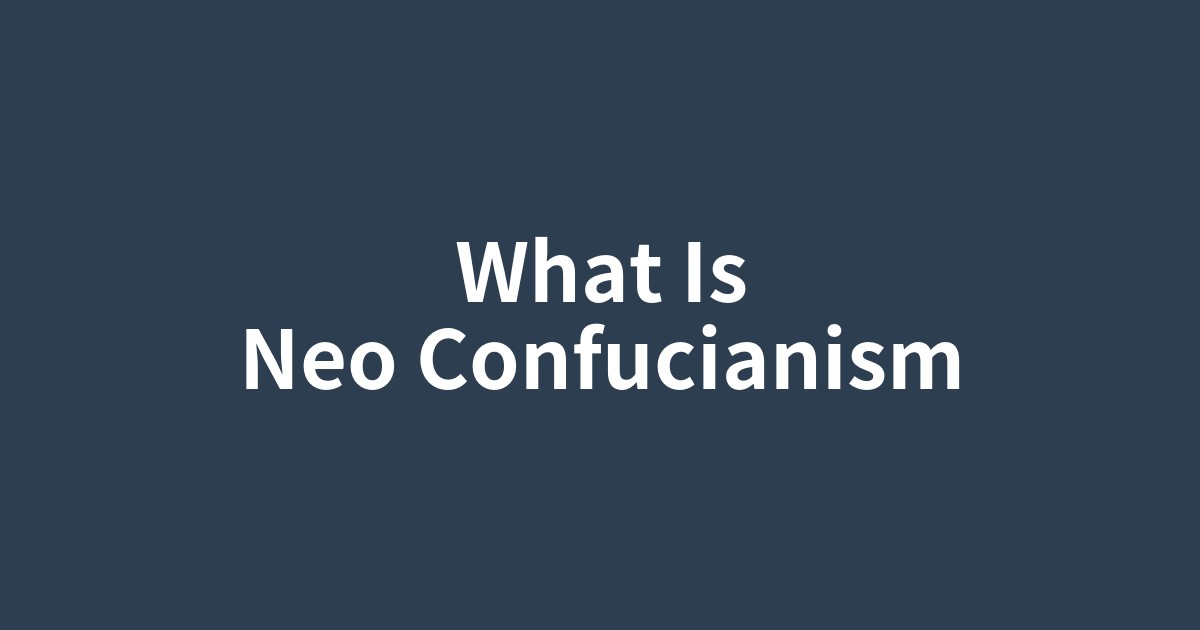このページは、歴史や文化の物語を楽しみながら、その文脈の中で重要な英単語を自然に学ぶための学習コンテンツです。各セクションの下にあるボタンで、いつでも日本語と英語を切り替えることができます。背景知識を日本語で学んだ後、英語の本文を読むことで、より深い理解と語彙力の向上を目指します。

儒教を宇宙の根本原理「理」と結びつけ、体系的な思想に発展させた朱子学。江戸時代の日本の支配階級に、なぜ受け入れられたのか。
この記事で抑えるべきポイント
- ✓朱子学は、儒教に「理」(宇宙の根本原理)と「気」(万物を構成する要素)という宇宙論的な視点を導入し、体系化した哲学であるという点。
- ✓朱子学が説く「理」に基づく上下の秩序や身分を重んじる思想(大義名分論)が、江戸幕府の支配体制を理論的に支える上で好都合であったという点。
- ✓幕府によって「官学」とされたことで、朱子学は武士階級の必須教養となり、その自己を律する精神(居敬窮理)が「武士道」の倫理観形成に影響を与えた可能性があるという点。
- ✓社会の安定に寄与した一方で、その形式主義的な側面が、後世において思想の硬直化を招いたという批判的な見方もある点。
朱子学とは何か ― 日本の武士道にも影響を与えた思想
「武士道」の精神的な支柱と聞くと、何を思い浮かべるでしょうか。その根底には、実は中国から伝わった「朱子学」という哲学が深く関わっているという見方があります。本記事では、朱子学がどのような思想であり、なぜ江戸時代の日本社会、特に武士階級に受け入れられたのか、その歴史的背景と現代に至る影響を探求します。
What is Neo-Confucianism? - The Ideology that Influenced Japan's Bushido
When you think of the spiritual pillars of "Bushido," what comes to mind? One perspective is that a philosophy from China, known as "Neo-Confucianism" (Shushigaku), is deeply involved at its core. This article explores what kind of ideology Neo-Confucianism is, why it was accepted in Japanese society during the Edo period, especially by the samurai class, and its historical background and influence extending to the present day.
朱子学の誕生 ― 宇宙の原理「理」で世界を捉え直す
朱子学は、従来の儒教を飛躍的に発展させた思想体系です。その創始者である南宋の思想家・朱熹(しゅき)は、個人の倫理道徳にとどまらず、世界の成り立ちそのものを説明しようと試みました。彼は、この「宇宙(universe)」と万物を貫く根本的な法則として「理(principle)」という概念を打ち立てました。そして、世界に存在するあらゆるものは、この普遍的な「理」が、物質を形作るエネルギーである「気」と結びつくことで現象として現れると考えたのです(理気二元論)。この壮大な思想は、人間の内面的な道徳心から社会秩序、そして自然界の成り立ちまでを、一つの論理で体系的に説明しようとする知的な挑戦でした。
The Birth of Neo-Confucianism - Reimagining the World with the Cosmic "Principle"
Neo-Confucianism is a philosophical system that dramatically evolved from traditional Confucianism. Its founder, the Southern Song dynasty thinker Zhu Xi, attempted to explain not only individual ethics and morals but the very structure of the world itself. He established the concept of "ri" (principle) as the fundamental law governing the entire universe and all things within it. He believed that everything in the world manifests as a phenomenon when this universal principle combines with "qi," the material energy that forms matter (Dualism of Principle and Qi). This grand ideology was an intellectual challenge to systematically explain everything from the inner morality of humans to social order and the workings of the natural world with a single logic.
なぜ江戸幕府は朱子学を「官学」としたのか
朱子学が説く思想の中でも、特に支配者層にとって魅力的だったのが「大義名分論」です。これは、君主と臣下、父と子など、それぞれの身分や立場に応じた役割を全うすることが社会秩序の根幹であるとする考え方です。徳川家康に仕えた儒学者・林羅山は、この思想こそが社会を安定させると進言しました。江戸幕府は、この教えを武士を頂点とする士農工商という厳格な「階級制度(hierarchy)」を正当化するための強力な「イデオロギー(ideology)」として採用します。こうして朱子学は幕府公認の学問、すなわち「官学」となり、その後の日本の支配体制を理論的に支える屋台骨となっていったのです。
Why Did the Edo Shogunate Make Neo-Confucianism its "Orthodoxy"?
Among the ideas preached by Neo-Confucianism, the "Theory of Justified Names and Roles" was particularly attractive to the ruling class. This is the idea that the foundation of social order lies in each person fulfilling the role corresponding to their status, such as ruler and subject, or parent and child. The Confucian scholar Hayashi Razan, who served Tokugawa Ieyasu, advised that this very ideology would stabilize society. The Edo Shogunate adopted this teaching as a powerful ideology to justify its rigid hierarchy of samurai, farmers, artisans, and merchants, with the samurai at the top. Thus, Neo-Confucianism became the officially recognized scholarship of the shogunate, or its "orthodoxy," and went on to become the theoretical backbone supporting Japan's ruling system.
武士道への影響 ― 「忠義」と「自己修養」の精神
幕府によって奨励された朱子学は、武士階級にとって必須の教養となりました。特に、私的な欲望を抑え、自己を律することで内なる「理」を追求するという「自己修養(self-discipline)」の考え方は、武士に求められる克己心やストイックな生き方と強く共鳴しました。この精神的な鍛錬が、主君に対する絶対的な「忠義(loyalty)」や、私を滅して公に奉仕するという献身的な姿勢を育んだと考えられています。朱子学が、武士階級特有の気風や倫理観、すなわち武士道の「精神(ethos)」の形成に与えた「影響(influence)」は、決して小さくないと言えるでしょう。
Influence on Bushido - The Spirit of "Loyalty" and "Self-Discipline"
Promoted by the shogunate, Neo-Confucianism became an essential part of education for the samurai class. In particular, the idea of self-discipline—suppressing personal desires and disciplining oneself to pursue the inner "principle"—resonated strongly with the self-control and stoic way of life demanded of samurai. This spiritual training is thought to have cultivated an absolute loyalty to one's lord and a selfless devotion to public service. The influence that Neo-Confucianism had on the formation of the unique spirit and ethics of the samurai class, namely the ethos of Bushido, was by no means small.
朱子学の光と影 ― 安定と停滞の二面性
朱子学が江戸時代の社会秩序の安定に大きく貢献したことは間違いありません。その体系的な教えは、人々に社会的な役割と行動規範を与え、約260年続く平和な時代の礎を築きました。しかしその一方で、光が強ければ影もまた濃くなります。幕府の「官学」として絶対的な権威を持つようになると、その教えは次第に形式化し、硬直化していきました。異なる考え方や新しい思想を抑圧する傾向が強まり、社会の自由な活力や創造性を停滞させる一因になったという批判的な見方も存在します。思想が持つ、安定と停滞という二面性を朱子学は体現しているのです。
The Light and Shadow of Neo-Confucianism - The Duality of Stability and Stagnation
There is no doubt that Neo-Confucianism contributed greatly to the stability of social order during the Edo period. Its systematic teachings provided people with social roles and codes of conduct, laying the foundation for an era of peace that lasted about 260 years. However, where the light is strong, the shadow is also deep. As it gained absolute authority as the shogunate's "orthodoxy," its teachings gradually became formalized and rigid. The tendency to suppress different ideas and new thoughts grew stronger, and there is a critical view that it became a cause of stagnation in society's free vitality and creativity. Neo-Confucianism embodies the duality of an ideology, possessing both stability and stagnation.
結論として
本記事では、朱子学が単なる古代中国の哲学ではなく、日本の社会構造、特に江戸幕府の体制と武士の精神性に深く根ざした思想であることを探りました。宇宙の根本原理から個人の生き方までを貫くその体系的な思想は、社会を安定させる「イデオロギー」として機能する一方、武士の「忠義」や自己規律といった倫理観を育む土壌ともなりました。その思考の痕跡は、現代日本の組織文化や個人の倫理観の中に、今なお見て取れるかもしれません。朱子学というレンズを通して日本の精神史を捉え直すことは、私たち自身の価値観を省みる、新たな思索の扉を開いてくれるのではないでしょうか。
In Conclusion
In this article, we explored how Neo-Confucianism was not merely an ancient Chinese philosophy but an ideology deeply rooted in Japan's social structure, particularly the Edo Shogunate's system and the samurai spirit. Its systematic thought, which runs from the fundamental principle of the universe to an individual's way of life, functioned as an ideology to stabilize society while also becoming the fertile ground that nurtured the ethics of the samurai, such as loyalty and self-discipline. Traces of its way of thinking may still be visible today in modern Japanese organizational culture and individual ethics. Re-examining Japan's intellectual history through the lens of Neo-Confucianism may open a new door to reflection, prompting us to contemplate our own values.
テーマを理解する重要単語
principle
朱子学の核心概念「理」の英訳として登場します。単なる「原則」だけでなく、宇宙万物を貫く根本法則という壮大なニュアンスを掴むことが、朱子学の思想体系のスケール感を理解するために不可欠です。この記事の知的探求の出発点と言えます。
文脈での用例:
He has high moral principles.
彼は高い道徳的信条を持っている。
loyalty
武士道精神を語る上で中心的な価値観である「忠義」を表します。この記事では、朱子学の自己修養の教えが、主君に対する武士の絶対的な「忠誠心」を育む土壌となったと論じています。武士の倫理観の形成過程を理解する鍵です。
文脈での用例:
Absolute loyalty to one's lord was a knight's most important virtue.
主君への絶対的な忠誠は、騎士の最も重要な徳目であった。
influence
この記事全体を貫くテーマ「影響」を表す基本単語です。朱子学が武士道や江戸社会に与えた「影響」という視点で全文が構成されています。名詞だけでなく「影響を与える」という動詞としての用法もマスターしておくと表現の幅が広がります。
文脈での用例:
His parents still have a great deal of influence over his decisions.
彼の両親は今でも彼の決断に対して大きな影響力を持っている。
suppress
朱子学がもたらした「影」の側面、つまり負の側面を説明するために使われています。思想が「官学」として権威を持つと、異なる意見や新しい考え方を「抑圧する」力として働き、社会の活力を失わせる危険性を指摘する文脈で登場します。
文脈での用例:
The government used the army to suppress the rebellion.
政府は反乱を鎮圧するために軍隊を使った。
justify
「〜を正当化する」という意味で、権力と思想の関係を理解する上で非常に重要です。江戸幕府が、自らにとって都合の良い身分制度を「正当化する」ための理論的支柱として朱子学を採用した、という記事の核心的な論理を的確に捉えることができます。
文脈での用例:
He tried to justify his actions by explaining the difficult situation he was in.
彼は、自身が置かれていた困難な状況を説明することで、自らの行動を正当化しようとした。
hierarchy
江戸幕府が朱子学を「官学」とした理由を解き明かす上で欠かせない単語です。朱子学の教えが、武士を頂点とする士農工商という厳格な「階級制度」を理論的に支えるのに好都合だった、という歴史的背景を的確に示しています。
文脈での用例:
The myth of Purusha justified a rigid social hierarchy with the priests at the top.
プルシャの神話は、司祭を頂点とする厳格な社会階層制を正当化しました。
ideology
この記事の中心テーマの一つです。朱子学が単なる哲学に留まらず、江戸幕府によって社会秩序を正当化するための強力な「思想体系」として利用されたことを理解する鍵となります。思想が持つ政治的な側面を捉える上で不可欠な単語です。
文脈での用例:
The two countries were divided by a fundamental difference in political ideology.
両国は政治的イデオロギーの根本的な違いによって分断されていた。
stagnation
朱子学がもたらした「光と影」の二面性を象徴する単語です。社会に安定をもたらした一方、その教えが硬直化し、自由な創造性を妨げ社会の「停滞」を招いたという批判的な視点を理解する上で不可欠。物事の功罪を論じる際に役立ちます。
文脈での用例:
The prolonged economic stagnation led to high unemployment.
長期にわたる経済の停滞は高い失業率につながった。
systematic
朱子学がなぜ大きな影響力を持ち得たのかを説明する鍵です。個人の道徳から宇宙の成り立ちまでを一つの論理で「体系的に」説明しようとした点が、その思想の魅力であり、社会を包括的に支配するイデオロギーとなり得た理由を示しています。
文脈での用例:
The company has a systematic approach to training new employees.
その会社は、新入社員を研修するための体系的なアプローチを持っています。
ethos
武士道が持つ特有の「精神」や「気風」を表現するのに最適な、知的な単語です。この記事では、朱子学が武士階級の倫理観、つまり武士道の「ethos」の形成に大きく影響したと論じています。文化や集団の精神性を語る際に使える語彙です。
文脈での用例:
Neo-Confucianism had a significant influence on the formation of the samurai ethos.
朱子学は、武士の精神(エートス)の形成に大きな影響を与えました。
orthodoxy
朱子学が幕府公認の学問、すなわち「官学」となったことを示す、やや専門的ですが重要な単語です。「正統」と認められることで、その思想が絶対的な権威を持ち、他の考えを排除する力を持つに至った経緯を理解する上で役立ちます。
文脈での用例:
The professor challenged the established orthodoxy in her field of study.
その教授は、自身の研究分野における確立された定説に異議を唱えた。
self-discipline
朱子学が武士の精神に与えた影響を具体的に示す言葉です。「自己修養」や「克己心」と訳され、私的な欲望を抑えて公に尽くすというストイックな生き方を指します。これが武士道と強く共鳴した点を理解することが、記事の核心に迫る上で重要です。
文脈での用例:
The idea of self-discipline resonated strongly with the stoic way of life demanded of samurai.
自己修養という考え方は、武士に求められたストイックな生き方と強く共鳴しました。